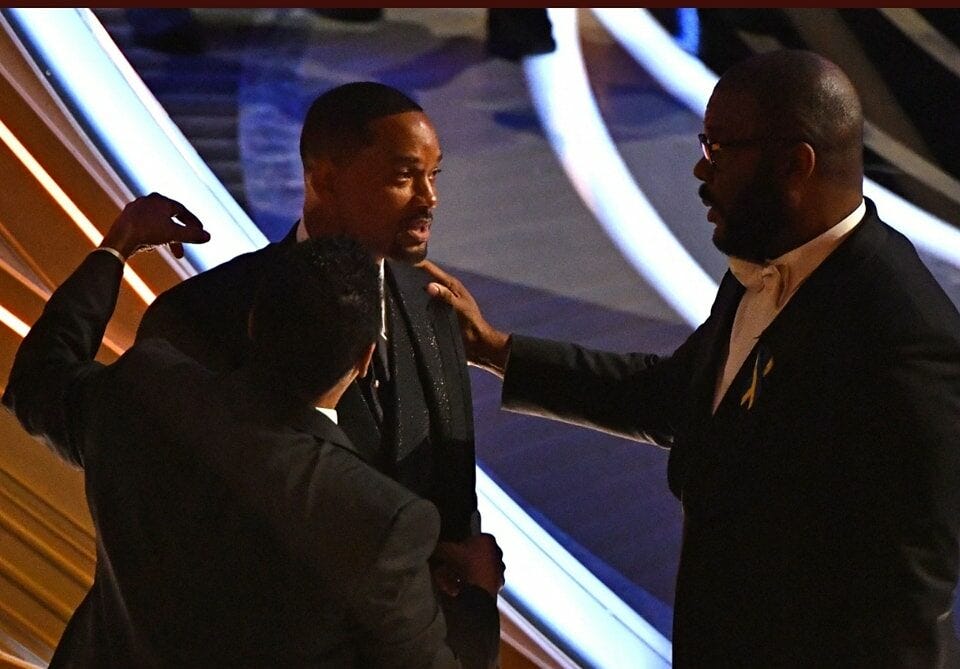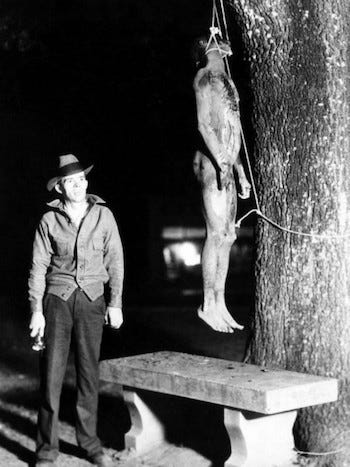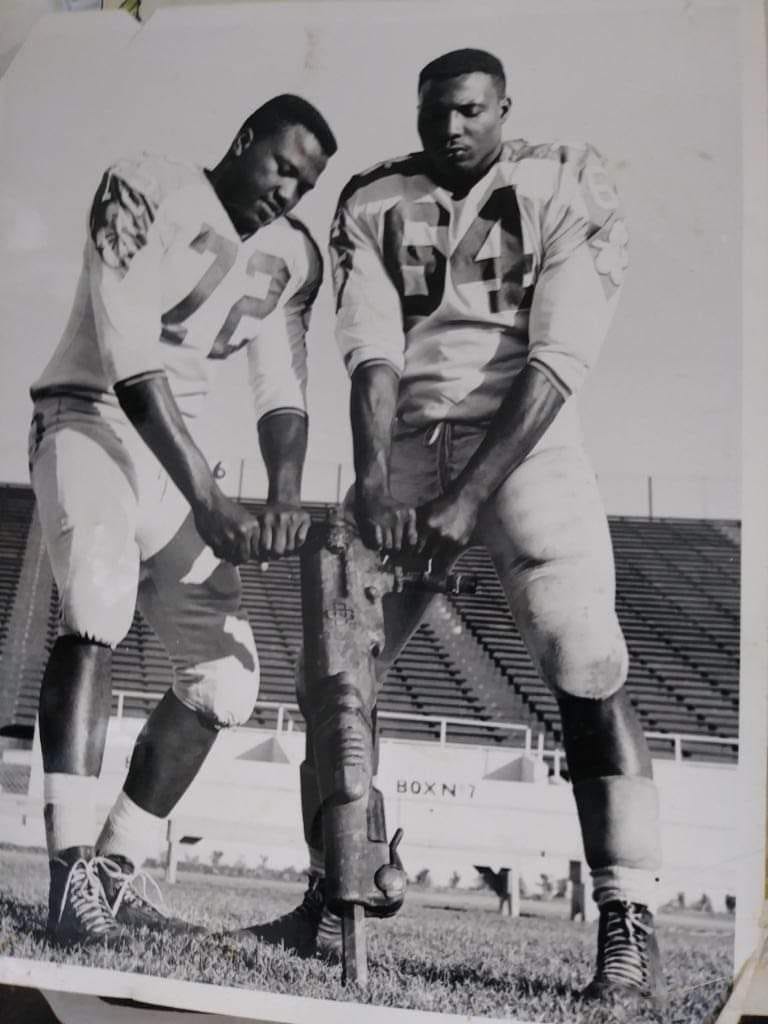Have you ever wondered what the phrase "toxic masculinity" means when directed towards Black men?
Academy Award winner Denzel Washington and movie mogul Tyler Perry consoling Will Smith shortly after he slapped comedian Chris Rock at the 2022 Oscars. Smith later won Best Actor for “King Richard,” and has issued an apology to Rock for his conduct.
While the linguist in me knows fully well that "toxic" is a synonym for "poisonous," and "masculinity" describes those attributes relating to men, I admit that when I hear the phrase targeted towards Black men, like yesterday when lawyer-journalist Sunni Hostin described Academy Award winner Will Smith's slap to comedian Chris Rock's face during Sunday night's Oscars ceremony as such, my inner philosopher gets inspired to ponder the deeper meaning of the phrase:
"TOXIC MASCULINITY"
To begin today's blog, it is important to remind that Black men in America are largely descendants of Africans that were stolen, bartered, beaten, broken, and shipped across the Atlantic to serve as enslaved chattel all across the Americas as well as in the Atlantic and Carribean Isles.
Thus, from the very first in 1619, enslaved African males became broken men; worked tirelessly, whipped viciously and incessantly, branded like cattle, and maimed at whim by white owners and overseers.
When those white owners in the South joined their wealthy white kinsmen in the North to declare independence from Great Britain and later form the United States, the very Constitution that they ratified, one that is lauded as the pinnacle of the Age of Enlightenment, was actually quite dim in that it deemed Blacks "3/5ths" of a whole white person for Census purposes!
That deep and insidious Constitutional slight, one that held that Black men were 3/5ths of white men, greatly damaged the psyche of our ancestors far deeper than the leather lashes and branding irons that defiled their flesh. The so-called "Slave Codes," which would later become the "Black Codes" during Jim Crow, meant that for over 300 years, Black men could not look white men in the eye; grown Black men were called "boy" by white men, white women, and even white children; enslaved Black men could be killed for learning how to read, and were brutally lynched by overseers for even the mere allegation of being "too familiar" with white women.
Claude Neal, 19, was lynched for allegedly raping a white woman in Marianna, Florida in 1934. His charred remains where hung on the Jackson County Courthouse steps to terrorize local Blacks. None of his killers were ever brought to justice.
Enslaved Black men also knew that the master or overseer had carte blanche to walk into the slave quarters and take sexual liberties with their spouses or girl children—and there was nothing that the forlorn Black man could do but allow it to happen.
When slavery was over and slavery by another name, "sharecropping," took its place, white males who owned the land and the company store conspired to reap all of the profits—while paying a mere pittance to "free" Black men (while trapping their families into generational debts owed to the store owners who leased farming equipment and sold food).
Free Black men were still subject to whippings by the KKK and affiliated degenerate white males deep into the 1960s; free Black men were prevented from voting and beaten or killed for even trying to register to vote deep into the 1960s; free Black men still were subjected to being removed from their car...on a date...at gunpoint...so that degenerate white males could rape and defile a young Black woman, as was the case on Tallahassee's Southside in the late 1950s.
That last reference, the rape of a young Black woman, happened during my father's freshman year as a football player at Florida A&M University. When he and his teammates returned for the next quarter, many brought weapons back with them so as to protect themselves should a similar scenario arise.
Charles Hobbs (#64) was a powerful guard/linebacker at Florida A&M from 1958-62. But he armed himself after a young Black woman was brutally raped by racist whites during his freshman year.
Which leads me to the main point of today's essay on toxic masculinity, which is that what Black boys learn about manhood usually comes from the men that they are raised by or around. Further, how we handle overt racism and white supremacy, or covert racism and white supremacy, and how we interact among Black men, women, and children, depends greatly on the lessons learned from older Black males during our childhood.
While I was not blessed to know my father's father, Robert Hobbs, or his beloved grandfather, King David, I have heard enough stories to know that they were brilliant and physically powerful Black men who were still emasculated by intellectually and physically inferior white males who comprised the numerical majority.
Four generations of my paternal legacy
Suffice it to say that my father, and his father before him, and his before him, were bitterly angry towards white racists in general, and racist white males in particular, because they knew that they were equal or greater than their white male counterpoints in all of the attributes that define masculinity. And yet, due to laws and customs that forced so many Black males to hoist signs that read "I Am a Man" during the Civil Rights era, the fact that such affirmations were even necessary made many "wanna holler," as Marvin Gaye sang in the 1970s.
Thus, the anxiety, the anger, and the righteous indignation that many Black males have felt through the centuries is deeply rooted in not even being deemed "men" by American society—until very recent history.
The tragedy in this reality is that far too often, the outward manifestation of Black males being maimed, murdered, and marginalized by the dominant white society is that those closest to Black men, meaning their wives, their children, and other close kin and friends, often received the brunt of their implosions. While folks don't like to talk about it in the public square, far too many Black women and children have been beaten unmercifully by their Black husbands and fathers through the centuries all because those Black men couldn't beat their white racist tormentors without risk of lynching or imprisonment.
Such Black male anger still occasionally flares up on the job or at social events and settings like the Oscars, all because most of us were never taught how to adequately channel anger in a productive way, be it toward Blacks or whites, that cross the boundaries of respect.
For example, during the first year of the Coronavirus Pandemic, when many people were still being flippant about mask wearing, I was wearing mine one Saturday afternoon and awaiting an order of spicy wings from my neighborhood Publix supermarket. As I chatted with the deli assistant, a slightly older white male who was not wearing a mask walked up and interrupted our convo to ask how long before more wings would be displayed.
While his rudeness was bad enough, the masked marauder then walked within inches of my side and started criticizing the assistant for not having more wing boxes available on a college football Saturday. At this point, the man was close enough that I was still worried about Covid laced spittle, so I politely, but firmly, asked him to back up off of me. Looking puzzled, he said "I ain't bothering you," which then saw my anger shoot from 0 to 100 with my reply, "back off or I'm gonna throw your ass into that vat of hot chicken grease."
The maskless marauder turned beet red, mumbled something that I couldn't comprehend, and walked away. But thinking back, knowing how my own temper is set up, I realize that the instantly seething level of anger that I displayed that day was totally disproportionate to the offense. In hindsight, I am glad that the maskless marauder walked away because had he bucked and compelled me to throw him into that chicken grease, I would have been arrested for aggravated battery and placed my entire livelihood and the future of my Hobbs descendants in jeopardy.
Fortunately, I recognize, with the aid of my de facto therapist, which is my mother, and my actual psychological therapist (and fellow Black man), Dr. Dana Dennard, that our negative responses as Black men are colored by those very multi-generational traumas that I describe herein. Which is why as heirs of that ignoble legacy, perceived disrespect, be it small or great, often leads far too many of us to choose inappropriate humor (laughing to keep from crying), and in other instances, rhetorical or physical violence. Choices, I add, that lead to regret when the consequences become painfully dire.
Will Smith descends from this Black male legacy...as does Chris Rock...as does Ol' Hobbs...and the anger that has been passed down through the generations can only be assuaged when we, as Black men, normalize seeking mental health therapy with the same fervor that we encourage each other to check our prostate, our blood sugar, and our cholesterol levels. Here's hoping that my Brother readers choose therapy instead of violence...
Thank you for subscribing to the Hobbservation Point—have a wonderful day!









As always, your presentation contains great historical background and recommendations. As a Black Man only twice removed from slavery, born and raised in Mobile, AL and Gulfport, MS it obvious that my growth and development includes the experience with racism and how to cope with such, choosing to leave the south allowed an opportunity to explore the West Coast, attending college and joining the military, however, none of the events permitted me to forget or repress my past experiences which oftentimes lead to confrontational fights and being around some of my colleagues who profess to be of a denial group will not allow me to want to forget who we are and the possibility ot its return.
Very difficult, took me all day to read, but so very profoundly important. Thank you.